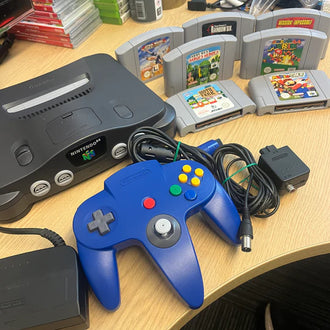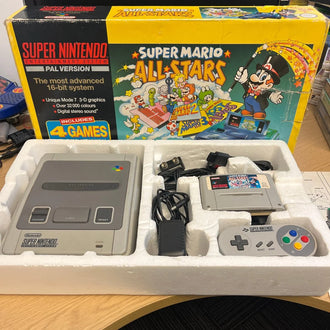The Ultimate Guide to Collecting Vintage Video Games
The Ultimate Guide to Collecting Vintage Video Games
Introduction
Remember the days of blowing into cartridges, mashing buttons on chunky controllers, and marvelling at pixelated graphics? If you're nodding along with a wistful smile, you might just be the perfect candidate for vintage video game collecting. This hobby isn't just about amassing dusty old consoles and game cartridges; it's a thrilling journey through gaming history, a quest for rare treasures, and a way to preserve the interactive art that shaped generations.
Whether you're a seasoned collector or a curious newcomer, this guide will take you through the ins and outs of vintage game collecting, with a particular focus on the UK scene. So grab a cuppa, settle into your favourite gaming chair, and let's embark on this pixelated adventure!
Getting Started with Vintage Game Collecting
Defining Your Collection Focus
Before you start rummaging through charity shops or scouring online marketplaces, it's essential to define what you want to collect. Are you mad for Mega Drive? Passionate about PlayStation? Or perhaps you're all about handheld gaming? Focusing your collection can help you become an expert in a specific area and prevent your hobby from becoming overwhelming.
"Did You Know?" The term 'vintage' in gaming is quite flexible. While some collectors focus on pre-2000s consoles, others might include early 2000s systems in their vintage collections.
Essential Knowledge for Beginners
Research, research, research: Learn about different consoles, game releases, and regional variations. Websites like RetroCollect and GameValueNow are great resources.
Understand conditions: Games in better condition are generally more valuable. Learn to spot signs of wear and damage.
Be patient: Building a collection takes time. Don't feel pressured to buy everything at once.
Network with other collectors: Join online forums or local gaming groups to share knowledge and potentially trade.
Setting a Budget
Let's be honest, collecting vintage games can be as cheap as a Poundland bargain bin or as expensive as a night out in London's West End. Set a realistic budget and stick to it. Remember, it's not about who has the biggest collection, but about the joy of the hunt and the memories each piece brings.
Where to Find Vintage Games and Consoles
Local Sources
Charity Shops: The UK's charity shops are a goldmine for vintage game hunters. Don't be afraid to ask staff if they have any games in the back.
Car Boot Sales: Wake up early on a Sunday and you might just snag some retro gaming gold.
Local Game Shops: While not as common as they once were, some independent game shops still exist and often have a retro section.
Online Marketplaces
eBay: The go-to for many collectors, but be wary of counterfeit items.
CeX: Known for their high street presence, their website often has a good selection of retro games.
Retro game-specific sites: Websites like RetroGames.co.uk specialise in vintage gaming.
Gaming Conventions and Swap Meets
Play Expo: One of the UK's largest gaming events, with a huge marketplace for retro games.
Retro Games Fair: Held in various locations across the UK, these events are perfect for finding rare items and meeting fellow collectors.
Determining the Value of Vintage Games
Factors Affecting Value
Rarity
Condition
Completeness (box, manual, inserts)
Region (PAL vs NTSC)
Special editions or variants
Using Price Guides and Online Resources
Websites like PriceCharting provide up-to-date values for games across different platforms. However, remember that the UK market can differ from global trends, so also check recent eBay sold listings for a more localised view.
Understanding Grading Systems
While not as common in the UK as in the US, game grading services like WATA and VGA provide a standardised way to assess a game's condition. However, many UK collectors rely on their own judgment and detailed photos when buying online.
Preservation and Maintenance
Proper Storage Techniques
Store games vertically to prevent warping
Use acid-free boxes or sleeves for cartridges
Keep games away from direct sunlight and humidity
Cleaning and Repairing Old Hardware
Use isopropyl alcohol for cleaning cartridge contacts
Learn basic soldering for simple repairs
Consider investing in a game bit screwdriver set for opening consoles
Preserving Game Packaging and Manuals
Use clear, archival-quality sleeves for manuals
Store boxes in protective cases
Handle everything with clean, dry hands
The Cultural Significance of Vintage Games
Vintage games are more than just old technology; they're a crucial part of our cultural heritage. They've shaped storytelling, technology, and even how we socialise. By collecting and preserving these games, you're helping to maintain a vital part of gaming history.
"Games are the new language of our post-text culture. They're how we communicate now." - James Newman, Professor of Digital Media at Bath Spa University
Video Game Museums and Exhibitions
The UK is home to several excellent video game museums and exhibitions:
The National Videogame Museum in Sheffield
The Centre for Computing History in Cambridge
Temporary exhibitions at the V&A and Science Museum in London
These institutions play a crucial role in preserving gaming history and educating the public about the cultural impact of video games.
Building a Collection: Beyond the Games
While the games themselves are the stars of the show, don't overlook other collectibles that can add depth to your collection:
Gaming magazines (Your Sinclair, Mean Machines, CVG)
Promotional posters and standees
Strategy guides and hint books
Original artwork and design documents
Soundtracks and OSTs
The Vintage Gaming Community
One of the best parts of collecting vintage games is the community. Here's how to get involved:
Join online forums like RetroCollect or Reddit's r/retrogaming
Attend local gaming meetups or tournaments
Start a YouTube channel or blog to share your collection and knowledge
Participate in or organise game swaps
Common Challenges and How to Overcome Them
Dealing with Scams and Counterfeit Items
Unfortunately, the vintage game market isn't immune to scams and counterfeits. Here's how to protect yourself:
Always ask for detailed photos, including the PCB for cartridge games
Be wary of deals that seem too good to be true
Learn to spot common signs of counterfeit games (wrong label materials, off-colour plastic, etc.)
Buy from reputable sellers when possible
Managing Space for Your Growing Collection
As your collection grows, space can become an issue. Consider:
Investing in purpose-built storage solutions
Rotating your display to show off different parts of your collection
Selling or trading duplicates or games you're less interested in
Balancing Collecting with Actually Playing the Games
Remember, these games were meant to be played! Don't let your collection become a museum piece. Set up a dedicated retro gaming corner and make time to actually enjoy your games.
The Future of Vintage Game Collecting
As we look to the future, several trends are shaping the hobby:
Increasing prices for rare and sought-after games
Growing interest in preserving digital-only games
The rise of FPGA-based hardware for playing retro games
Continued debate over emulation vs. original hardware
While some see vintage game collecting as an investment opportunity, most collectors are in it for the love of the games. As physical media becomes less common in modern gaming, the appreciation for vintage games is likely to grow.
Conclusion
Collecting vintage video games is a rewarding hobby that allows you to preserve a piece of gaming history while indulging in nostalgia. Whether you're hunting for that elusive PAL version of "Earthbound" or simply want to replay the games of your youth, there's a place for you in the vintage gaming community.
Remember, the most important thing is to have fun. Collect what you love, play what you collect, and don't be afraid to share your passion with others. Happy hunting, and may your collections always be free of cartridge drift and disc rot!
Ready to start your collection? Why not share your first vintage gaming find or your holy grail item in the comments below? And if you're a seasoned collector, we'd love to hear your top tips for newcomers to the hobby!



